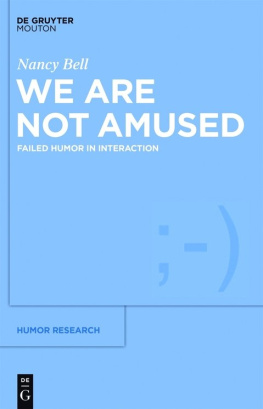Table of Contents
List of tables
- Tables in Chapter 1
- Tables in Chapter 2
- Tables in Chapter 4
- Tables in Chapter 6
- Tables in Chapter 7
- Tables in Chapter 11
List of illustrations
- Figures in Chapter 1
- Figures in Chapter 2
- Figures in Chapter 3
- Figures in Chapter 4
- Figures in Chapter 5
- Figures in Chapter 6
- Figures in Chapter 7
- Figures in Chapter 8
- Figures in Chapter 9
- Figures in Chapter 10
- Figures in Chapter 11
Landmarks
Table of Contents
The Psychology of Humor
An Integrative Approach
Second Edition
Rod A. Martin
Professor Emeritus, Department of Psychology, University of Western Ontario, London, Ontario, Canada
Thomas E. Ford
Professor, Department of Psychology, Western Carolina University, Cullowhee, NC, USA

Copyright
Academic Press is an imprint of Elsevier
125 London Wall, London EC2Y 5AS, United Kingdom
525 B Street, Suite 1650, San Diego, CA 92101, United States
50 Hampshire Street, 5th Floor, Cambridge, MA 02139, United States
The Boulevard, Langford Lane, Kidlington, Oxford OX5 1GB, United Kingdom
Copyright 2018 Elsevier Inc. All rights reserved.
No part of this publication may be reproduced or transmitted in any form or by any means, electronic or mechanical, including photocopying, recording, or any information storage and retrieval system, without permission in writing from the publisher. Details on how to seek permission, further information about the Publishers permissions policies and our arrangements with organizations such as the Copyright Clearance Center and the Copyright Licensing Agency, can be found at our website: www.elsevier.com/permissions.
This book and the individual contributions contained in it are protected under copyright by the Publisher (other than as may be noted herein).
Notices
Knowledge and best practice in this field are constantly changing. As new research and experience broaden our understanding, changes in research methods, professional practices, or medical treatment may become necessary.
Practitioners and researchers must always rely on their own experience and knowledge in evaluating and using any information, methods, compounds, or experiments described herein. In using such information or methods they should be mindful of their own safety and the safety of others, including parties for whom they have a professional responsibility.
To the fullest extent of the law, neither the Publisher nor the authors, contributors, or editors, assume any liability for any injury and/or damage to persons or property as a matter of products liability, negligence or otherwise, or from any use or operation of any methods, products, instructions, or ideas contained in the material herein.
British Library Cataloguing-in-Publication Data
A catalogue record for this book is available from the British Library
Library of Congress Cataloging-in-Publication Data
A catalog record for this book is available from the Library of Congress
ISBN: 978-0-12-812143-6
For Information on all Academic Press publications visit our website at https://www.elsevier.com/books-and-journals

Publisher: Nikki Levy
Acquisition Editor: Nikki Levy
Editorial Project Manager: Barbara Makinster
Production Project Manager: Anusha Sambamoorthy
Cover Designer: Matthew Limbert
Typeset by MPS Limited, Chennai, India
Preface
Humor is an ubiquitous human activity that occurs in all types of social interaction. Most of us laugh at something funny many times during the course of a typical day. Although it is a form of play, humor serves a number of serious cognitive, emotional, and social functions. Fascinating questions about humor touch on every area of psychology. Surprisingly, however, despite its obvious importance in human behavior, humor and related topics like laughter, irony, and mirth are hardly ever mentioned in psychology texts and other scholarly books. Although there is a sizable and continually expanding research literature on humor, most psychologists seem to have little systematic knowledge of it. Thus, the first edition of The Psychology of Humor: An Integrative Approach was published in 2007 to provide a comprehensive review of theory and empirical research on humor in each of the disciplines of psychology as well as research in related disciplines that augments the work of psychologists.
However, the psychology of humor, as a field, has rapidly expanded in the intervening years. Scholars in diverse areas of psychology (i.e., personality, cognitive, physiological, developmental, social, clinical, health, industrial/organizational) are increasingly investigating questions about the role of humor in topics within their disciplines. Indeed, over 1000 theoretical and empirical research articles related to the psychology of humor have been published since 2007.
Moreover, humor is an interdisciplinary topic. Scholars from a number of other disciplines, including anthropology, biology, computer science, linguistics, literary and cultural studies, neuroscience, philosophy, religious studies, and sociology contribute to the advancement of humor studies. Indeed, the research contributing to the psychology of humor has become more widely dispersed in publication outlets within psychology as well as these other disciplines. Accordingly, the second edition consolidates this expansive and disparate literature, often touching on contributions of other disciplines to maintain an up-to-date, informed, comprehensive, integrative review of theory and research findings that contribute to our understanding of the psychology of humor.
Like the first edition, we designed the second to serve multiple purposes and audiences. First, we intend the book to serve as a textbook for upper-level undergraduate and graduate-level courses on the psychology of humor. To facilitate the use of The Psychology of Humor: An Integrative Approach as a textbook, we have organized the chapters around different areas of psychology. We believe this will demonstrate to students how humor, a very intriguing, enjoyable, and personally relevant facet of human experience, can be approached from different psychological perspectives. Thus, like the first edition, the second covers the central research themes and questions across the different disciplines of psychology, highlighting key studies and integrating the findings from the most influential research to provide a comprehensive and compelling coverage of the psychology of humor.
Second, we intend the book to be useful as a research handbook for academic psychologists and scholars from other disciplines seeking to conduct their own research in this topic area. Therefore, in each chapter we note interesting, yet-unanswered questions, novel hypotheses derived from recent developments in various areas of psychology, and promising directions for future research. We hope that by making psychologists and other scholars aware of noteworthy research findings and intriguing questions that remain, this book will stimulate further interest in the psychology of humor as a research domain. To enhance the usefulness of the book as a reference guide, the second edition includes an extensive bibliography, with references to most of the important works in this literature as well as a comprehensive subject and author index.












